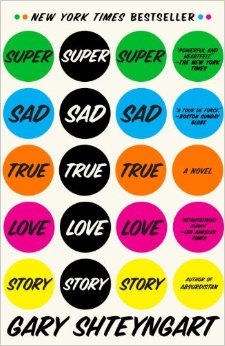Fiction for me is not an escape; it is an immersion in the real. I seek vivid renderings and eloquent language, beautifully parceled wisdom that I can take with me into my day. As such, I’ve never been much for tales of alternate universes, mystical beasts, or futuristic societies. Given my proclivity towards realism, I find that the eeriest and most effective science fiction reflects the world as it appears in a dream—elements altered such that familiar people and places take on new life while remaining wholly recognizable. You see a spurned lover but understand that this is your current spouse; your home is relocated to a foreign country, yet instinctually you know that this is the place you live, breathe, sleep.
SUPER SAD TRUE LOVE STORY is just this type of novel, which transports the reader to an instantly recognizable alternate reality. Gary Shteyngart, the author of THE RUSSIAN DEBUTANTE’S HANDBOOK, ABSURDISTAN and the memoir LITTLE FAILURE has come to be known for his sardonic wit, and SUPER SAD TRUE LOVE STORY does not disappoint. Shteyngart lays forth a satirical vision of New York on the brink of financial collapse, having seen both significant technological advancement and social deterioration. IPhones have been replaced by äppäräti, devices that endlessly stream information and constantly inform the user of his rank in the world, measured in terms of sexual appeal, wealth, and other superficial factors. The predominant issues plaguing the population—an increasing obsession with social status and an all-consuming drive towards materialism—seem to be simply an extension of the unsavory qualities of present-day New Yorkers. Protagonist Lenny Abramov muses, “Every returning New Yorker asks the question: Is this still my city? I have a ready answer, cloaked in obstinate despair: It is. And if it’s not, I will love it all the more. I will love it to the point where it becomes mine again.” Lenny gives voice to the unsettling realization of countless New Yorkers past: one cannot love this harsh urban landscape into submission. The faceless city is slipping from his grasp.
Central to Shteyngart’s dystopian narrative is society’s pursuit of immortality, another all-too-familiar trope. Lenny works in the business of life extension. Horrifyingly, his body has continued to age despite every effort to prevent, postpone, and reverse the damage of time. He is unceasingly reminded of his failed attempts at attaining eternal youth by his äppärät, which consistently ranks his attractiveness in the bottom tenth percentile of any room he enters.
Despite his body’s stubborn march towards death, Lenny quickly becomes enraptured by Eunice Park—a beautiful Korean American girl thirty years his junior. As the title indicates, Lenny’s winter–spring romance with Eunice lies at the heart of this story. He frequently describes their relationship in grandiose terms: “The love I felt for her on that train ride had a capital and provinces, parishes and a Vatican, an orange planet and many sullen moons.” One doesn’t expect breathtaking metaphors of love from an apocalyptic novel, yet here they are, nestled seamlessly among sardonic references to political turmoil and economic collapse.
The structure of the narrative serves to further emphasize the marvel of Lenny’s and Eunice’s against-all-odds romance. SUPER SAD TRUE LOVE STORY is a reimagining of the epistolary novel, alternating between Lenny’s diary and Eunice’s “Global Teens” correspondence via a new-age messaging system. This dramatic shifting of form serves to further delineate the disparity between the two characters. Lenny is a middle-aged man whose apartment is lined with books, those strange relics of times past. Eunice is a nearly illiterate twentysomething most often engaged in an online shopping frenzy. Their story could easily have veered towards the macabre. Instead, love takes root. Against a bleak dystopian landscape, SUPER SAD TRUE LOVE STORY ignites and enchants.





